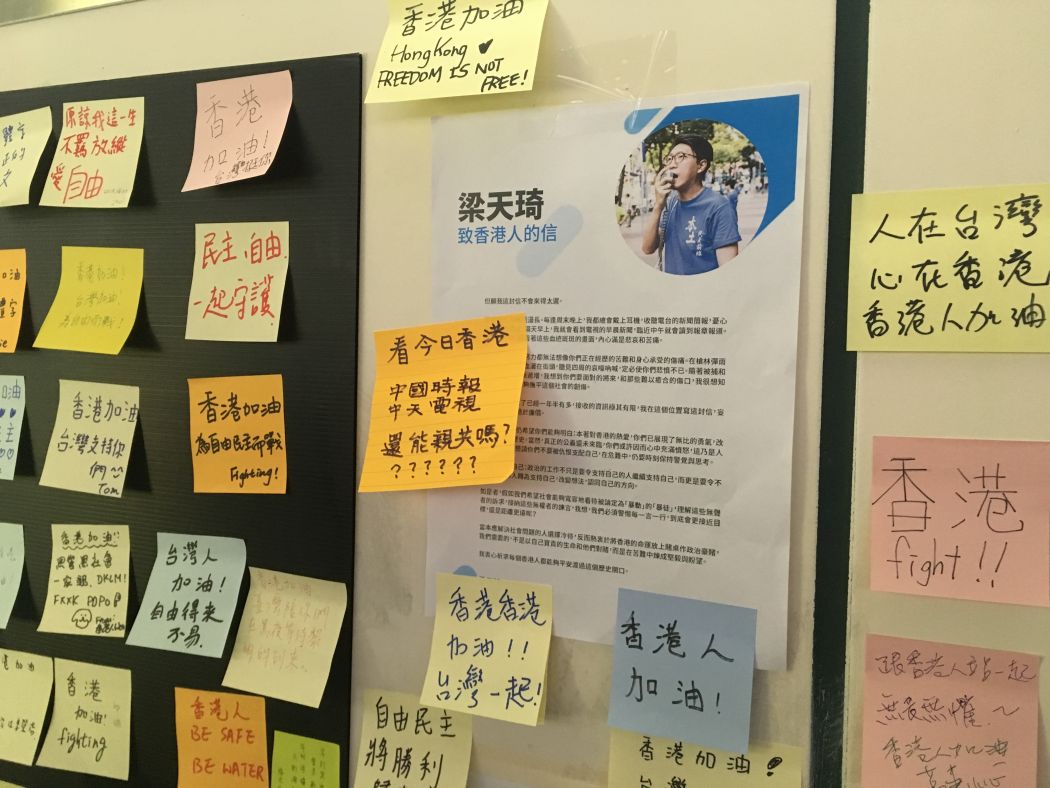“It is our Taiwan; we got to save it ourselves” was the rallying cry of Sunflower activists when they occupied their country’s Legislative Yuan in March 2014. Later that year, the slogan “Our Hong Kong, let’s save it ourselves” would become almost as synonymous as the yellow umbrella with the occupation of the city’s streets.
Both Sunflower and Umbrella movement activists proclaimed their commitment to democracy and their opposition to the People’s Republic of China. It is, therefore, no surprise that these protests have been linked together in the minds of outside observers. The connection has been made by activists and participants in Taiwan and Hong Kong too. In what might be one of the few positive examples of cross-strait relations in recent years.

One of the most visible manifestations of this relationship has been the public meetings between figures from Taiwan’s post-Sunflower New Power Party (NPP) and the likes of Joshua Wong, Nathan Law, and Alex Chow, among other pro-democracy figures.
Yet this shared solidarity goes much wider than politicians and leading social movement activists. Many Taiwanese are increasingly concerned about the affairs of the Special Administrative Region. Their recent outpouring of sympathy, as the streets of Hong Kong turned violent, is just one example of this. After all, it is natural for Taiwanese to care as Hong Kong’s ‘One Country Two Systems’ could be what Taiwan ends up with. This works the other way round too. For many Hongkongers, Taiwan, with its freedoms and autonomy, is what Hong Kong could become. If that seems like a far off dream at least right now, they see Taiwan – at the very least – as a potential place of refuge.

Since 2012, support for Taiwan becoming independent has been steadily increasing in Hong Kong according to the Hong Kong Public Opinion Research Institute. Throughout the 2000s support for Taiwan Independence hovered around the low-teens, while around three-quarters of respondents opposed. However, in recent years this gap has been significantly narrowed with results consistently showing a third of those surveyed backing independence with only half the public opposing. In the latest poll, conducted in the midst of the anti-extradition bill protests, the strong lead long enjoyed by those opposing independence has been wiped out with 43.7% for and only 44.1% against. While support for Taiwan’s independence may dip in future surveys the results of the past few years signal a sea change in Hong Kong.
Likewise, on the other side of the strait support for the Hong Kong protesters has been seen repeatedly over the past few weeks. On Sunday August 11, over 300 people turned-out, wearing red or black, to spell out ‘FREE HONG KONG’ with their bodies in Taipei’s Central Art Park (an impressive sight if you were high-up enough to see it). The following weekend events calling on Taiwan to stand with Hong Kong sprung up in other cities across the country from Taichung to Kaohsiung. Even more symbolic still has been the emergence of solidarity Lennon Walls at rally sites and in coffee shops.

After initially running into problems with Taipei City authorities, students have now semi-permanently transformed an underpass in Gongguan. Their display encapsulates the icons of the anti-extradition movement with small black SAR flags hanging from the ceiling, and a yellow raincoat pinned to the wall alongside a copy of activist Edward Leung’s letter from prison. Meanwhile, passers-by have filled the tunnel with multi-colour sticky notes, banners and posters expressing support for democracy and human rights. The message is simple: “香港加油” – “Hong Kong add oil.”

Taiwan’s President, Tsai Ing-wen, has also been resolutely behind the Hong Kong people ever since they took to the streets against the extradition bill. She tweeted in June:
The people of #Taiwan are watching closely the development of the #HongKongProtest.
In their pursuit of democracy & freedom, the people of #HongKong is not alone. Because we know that if you don’t stand for something, you will fall for anything. pic.twitter.com/degneLGkhy
— 蔡英文 Tsai Ing-wen (@iingwen) June 13, 2019
Such commendable statements have, unsurprisingly, not come from Tsai’s KMT 2020 challenger Han Kuo-yu – one of the few politicians about whose worldview could compete with Trump’s for the title of ‘Most Mercantilist’. He, readers may remember, infamously visited Beijing’s Liaison Office on his trip to Hong Kong shortly after becoming mayor of Kaohsiung, ostensibly on a fruit and veg selling mission. His “I don’t know” response to a question about the anti-extradition protests also suggests Han could also give the man in the White House a run for his money when it comes to winning a prize for A-grade ignorance.

In this context, Tsai comes off well but there is more that can be done. Her government can offer more than words to those facing political persecution in Hong Kong. Those attending rallies throughout Taiwan aren’t just standing in solidarity with those fighting for freedom across the strait, they’re also collecting helmets, gas masks and other protective items for those on the streets. Likewise, the Taiwanese government can offer protection, and opportunity, to Hongkongers whose safety and freedom are threatened due to political threats.
While this obligation is stipulated in the country’s law, the actual process can be long. Leaving many, for now, without an official status and unable to work or study. According to reports from Taiwan-based NGOs this appears to be the case with several of the island’s latest young arrivals. To resolve these current cases, in what could be the last few months for the Tsai administration, would be a noble act of cross-strait solidarity. As recent years have attested to, Hongkongers and Taiwanese know they’ve got to help save each other.
Hong Kong Free Press relies on direct reader support. Help safeguard independent journalism and press freedom as we invest more in freelancers, overtime, safety gear & insurance during this summer’s protests. 10 ways to support us.

